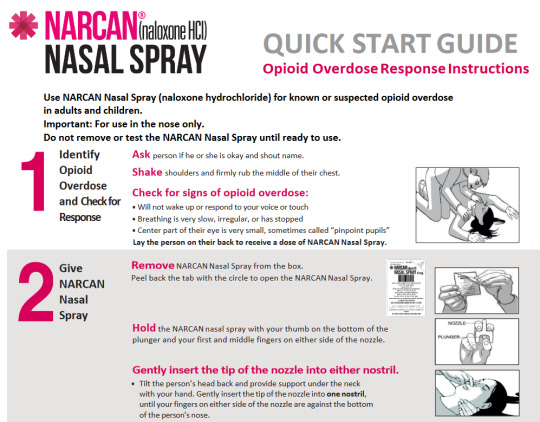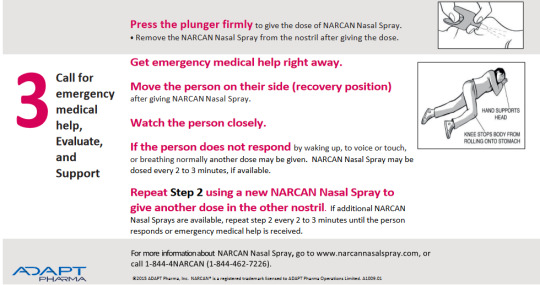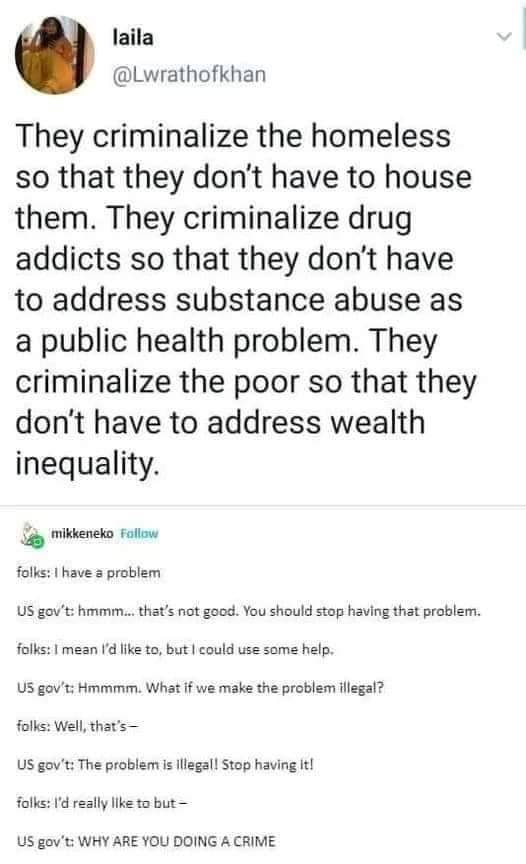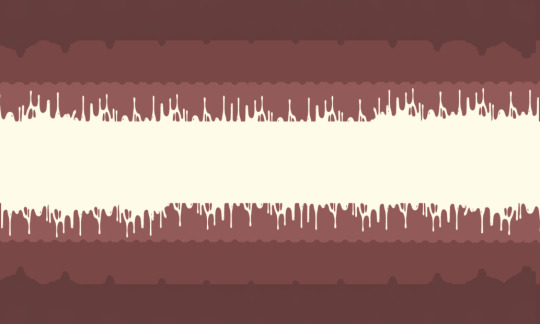#substance use
Explore tagged Tumblr posts
Text
i know this won't be available everywhere, but especially if you live in a larger city where a lot of folks are affected by opioid use/addiction, it's a really good idea to ask local pharmacies, and even food banks if they are giving out free narcan (naloxone). this can also be found at certain behavioral health offices as well, my case manager is able to get them for me for free. narcan is a life saving medication that can temporarily halt an opioid (oxycodone, hydrocodone, heroin, fentanyl, codeine, morphine, etc.) overdose while you wait for emergency medical services to arrive.
opioid overdose is distress of the respiratory system, meaning that the person overdosing likely is struggling to, or can't breathe at all. it's very important to watch to see if the person is dealing with labored or shallow breathing.
here the official use guide:


[Image ID start: Two screenshots from the FDA's Narcan (Naloxone HCl) Quick Start Guide infographic. It reads:
"Narcan (Naloxone HCl) Nasal spray quick start guide. Opioid Overdose Response Instructions.
Use NARCAN Nasal Spray (naloxone hydrochloride) for known or suspected opioid overdose in adults and children.
Important: For use in the nose only.
Do not remove or test the NARCAN Nasal Spray until ready to use.
1.) Identify Opioid Overdose and Check for Response Ask the person if they are okay and shout name.
Shake shoulders firmly and rub the middle of their chest.
Check for signs of Opioid Overdose:
Will not wake up or respond to your voice or touch
Breathing is very slow, irregular, or has stopped
Center part of their eye is very small, sometimes called "pinpoint pupils".
Lay the person on their back to receive a dose of NARCAN nasal spray.
2.) Give NARCAN nasal spray
Remove NARCAN nasal spray from the box. Peel back the tab with the circle to open the NARCAN nasal spray.
Hold the NARCAN nasal spray with your thumb at the bottom of the plunger and your first and middle fingers on either side of the nozzle.
Gently insert the tip of the nozzle into either nostril.
Tilt the person's head back and provide support under the neck with your hand. Gently insert the tip of the nozzel into one nostril, until your fingers on either side of the nozzle are against the bottom of the person's nose.
Press the plunger firmly to give the dose of NARCAN nasal spray.
Remove the NARCAN Nasal Spray from the nostril after giving the dose.
3.) Call for emergency medical help, Evaluate, and Support
Get emergency medical help right away.
Move the person on their side (recovery position) after giving NARCAN Nasal Spray
Watch the person closely.
If the person does not respond by waking up, to voice or touch, or breathing normally another dose may be given. NARCAN Nasal Spray may be dosed every 2 - 3 minutes, if available.
Repeat Step 2 using a new NARCAN Nasal Spray to give another dose in the other nostril. If additional NARCAN Nasal Sprays are available, repeat step 2 every 2 to 3 minutes until he person responds or emergency medical help is received.
For more information about NARCAN Nasal Spray go to www.narcannasalspray.com, or call 1-844-4NARCAN (1-844-462-7226)."
End image ID.]
#cripple punk#crip punk#cpunk#madpunk#mental health#neurodivergent#addiction#substance use#substance use disorder#opioid use#narcan#punk#diy punk#health#resources#mental illness#mental health support#naloxone#our writing#overdose mention#drugs mention#substance addiction
1K notes
·
View notes
Text
I love the euphemism "substance use" because truly, who among us has not used substances?
#language#linguistics#word nerdery#euphemisms#substance use#drugs mention#arrant pedantry#i'm using substances right now#if you know what i mean
2K notes
·
View notes
Text
maybe it’s because it’s “too obvious” but im surprised how few readings I’ve seen of the Substance (2024) that discuss the themes of addiction and substance (ha) use & abuse.
in moderation you can use the substance to become a better, more fun, easier, happier version of yourself. then you realize you no longer want to be who you are when you’re not on the substance. then taking the same dose that used to be enough before isn’t enough anymore, so you want to take more, and just a little bit more couldn’t hurt, right? so you start to take even more. but this is only taking away from sober you, which is painful and difficult and even scarier than what compelled you to take it in the first place, so of course you can’t stop now. now you want to take even more, you NEED to take even more. sober life becomes harder and harder to bear, especially compared to how much easier everything is on the substance. now you’re not only using it to enjoy that feeling anymore, you’re using it to hide from what you’re turning into without it, from what you’ve already turned into.
every minute that you’re sober is spent counting down the days until you can use again, and the ends of being high are spent dreading going back. the sober self is upset and jealous at how irresponsible the high self is. the high self is upset at how much of a buzzkill the sober self is, and wishes they could exist on their own, without requiring their sober tether to existence. but the sober and high selves are the same person, you are one, and you become jealous and angry at yourself for ruining your own life in a vain attempt to become an impossible version of yourself that you most desire to be.
you want so badly to have all—and only all—of the best parts that you milk yourself dry, until you end up with all—and nothing but all—of the bad parts. by the time you truly feel that you have indeed lost everything and know you need to stop, the damage is already done, and there is no going back. you wish you had stopped at the first chance, you wish you had never started to begin with. and even then for many people the only way to deal with this terrifying, painful reality is to use even more, because you have made this terrifying, painful life without your substance feel unliveable, even scarier yet than what had made you use in the first place. there is nothing left to do but to hide from your own life, and the only ways to do this are to stop, to love yourself and take care of the person that you are now… or to keep taking more and more, using until there is truly nothing left, not even yourself.
#the substance#the substance 2024#addiction#also obviously there’s lots of other stuff going on#with the movie in general it had many themes and none of them were subtle but still#I couldn’t stop thinking about this until I got it down#until I could get somebody else to be like yes I see you too#please this is very dark. take care of yourself#if you are struggling with addiction I see you. I care about you. I understand#and I understand how impossible it is to get off because of how scary it is to be without it#you aren’t alone#substance use#tw#shut up riley
966 notes
·
View notes
Text
People who use drugs deserve love and kindness.
Abstinence is not the only form of recovery. AA/NA doesn’t work for everyone. Sometimes people choose to use instead of meeting other needs, which is valid. Some people use for recreational purposes. Some people use for medicinal purposes. Some people who use have substance abuse disorder. Treatment looks different for everyone. Not everyone needs or wants treatment, for various reasons. The only thing Naloxone enables is breathing. Active use is not shameful. People who use drugs often also deal drugs. People in recovery should not shame active users. Active users deserve love. Active users deserve someone to check in on them, get them safer use supplies, and get them pizza. Active users deserve to be listened to. They deserve better than to have that be the first time anyone ever treated them as human since they began using.
Let’s care for each other.
#chronically couchbound#tw drugs#recovery#narcan#naloxone#harm reduction#harm redux#drug usage#addiction#active users#people in recovery#harm reduction saves lives#naloxone enables breathing#abstinence#alcoholism#substance use#substance addiction#safe use#safe use supplies#harm reduction is mutual aid#mutual aid#community care#narcan saves lives#AA/NA#narcotics anonymous#alcoholics anonymous
3K notes
·
View notes
Text

#human rights and civil liberties#poverty#classism#capitalism#homelessness#communism#fuck capitalism#late stage capitalism#housing rights#substance use#decriminalize drugs#decriminalised#crimes against humanity#class warfare
2K notes
·
View notes
Note
beer killed my father . he had a disease which destroyed his body and strained his relationships with his wife, his friends, and his children. Alcohol destroys everything it touches, theres a reason you see so many liquor stores in poor neighborhoods. don’t be fucking obtuse. Prohibition obviously doesn’t work, but I wish alcohol was taxed higher. And i want the CEO of Heineken on the guillotine right after Jeff Bezos.
before anything, i want to let you know that i am incredibly sorry about your father. alcohol has decimated entire generations of my family, played a crucial role in the neglectful family structure i spent the first 19 years of my life suffering under, + played a minor but not insignificant role in my brother's death. i would never undermine or dismiss that in anyone.
i used to feel very similarly to you, in large part because my mother is a recovering alcoholic who raised me to believe that alcohol is a magic poison which turns people into monsters + i, being her child, probably inherited a disease which would also turn me into a monster if i chose to drink. it's a deeply painful + understandable response to the pain that alcohol can cause.
my first question is, does alcohol really "destroy everything it touches"? are there not millions of people who engage with alcohol, in varying degrees of recreational use, who experience minimal or no negative impacts? or do you believe that everyone who drinks alcohol in any capacity is experiencing severe destruction in their lives as a result? does the existence of people for whom alcohol enriches their lives (or is a neutral presence) at all invalidate your experience, or your father's?
my second question is, you've identified that there are 'so many liquor stores in poor neighborhoods' (i would add there is a lot of alcohol in rich neighborhoods, just distributed in less stigmatized ways, like boutique wineries + fancy bars), do you think that companies are strategically attempting to create alcohol dependencies among poor people, or do you think that poverty creates the pain, hopelessness, + desperation which can fuel an alcohol habit (which is then exacerbated by intergenerational trauma + community alcohol culture).
i feel no allegiance to liquor companies- they absolutely do make the bulk of their profits off of people who are drinking in a way that is destroying their lives (unsure if i trust the exact scope of the research in that link but i trust the gist). however, liquor companies love the disease model, because it exempts them from responsibility. if alcoholism is truly a genetic disease, then liquor companies, bars, package stores hold no fault in the development of destructive drinking habits + community norms (natasha Schüll discusses this in her book about gambling addiction)- the people were already sick + would be getting it somewhere else, anyway, right? but as you have correctly identified, liquor companies help create the structures which turn alcohol use into an accessible + normalized mode of self-destruction.
my third question is, will taxing liquor help the real problem? yes, it reduces alcohol consumption, but does it reduce addiction? or does it make cheapskates like me say "i'm not fucking paying for that" while individuals who consume alcohol compulsively either eat the cost or turn to more illicit ways of obtaining alcohol. or, rephrased, is the problem that alcohol is too accessible? is alcohol a magical poison which turns 'normal' people into 'alcoholics'? alternatively, is alcoholism a genetic condition, unrelated to any outside circumstances, which is triggered by drinking?
or: is alcoholism one of many ways in which people who are experiencing hopelessness, pain, grief, poverty, trauma, etc use to numb themselves, harm themselves, + make life feel more bearable? at this point, i do believe there is at least a temperament factor which makes people more likely to use substances over other forms of escape (hence why my brother used substances while i turned to anorexia + do not struggle with substance use). are we actually addressing the problem if we make it more expensive (thus, mind you, further impoverishing people with alcohol addictions!)? or are we shifting the pain these people are experiencing to either other avenues (opioids, other drugs, totally different ways of coping which are often just as destructive) or an unregulated, underground alcohol market.
the way you are viewing alcohol, alcohol is a unique substance which is manufacturing or feeding illness in people in order to make them behave in ways which destroy their lives + the lives of others. the way i am viewing it, alcohol is a presence which can fill a void that is being created in people's lives as a response to structural, communal, or social suffering. when alcohol is painted as the cause of this pain, we are able to look the other way from a which world is structured to cause an immense amount of people to suffer needlessly. at the same time, the common sense observation that many of us engage with alcohol in ways which do not destroy our lives, as well as the knowledge that prohibition does not work, prevents the erasure of alcohol from public or private life.
who benefits from the belief that alcohol is a uniquely corrupting substance? what lessons did we actually learn from prohibition- is trying to do it to a lesser degree (make alcohol less accessible) actually going to do anything? when the price of opioids went up due to dea crackdowns, did people stop buying opioids or did the market flood with cheap + deadly fentanyl? is the problem that people are drinking or that they are suffering?
1K notes
·
View notes
Note
https://www.tumblr.com/saltminerising/776068336639459328/plague-skin-makers-this-post-is-for-you-do-not?source=share
I was high as balls sorry
.
42 notes
·
View notes
Text
Research first published informally by Vancouver’s Drug User Liberation Front has now been published in a peer-reviewed international journal. DULF bought heroin, cocaine and methamphetamine from online sources known to sell purer forms of these drugs, rigorously tested the drugs and then sold them at cost to its 47 compassion club members. Members lived in Vancouver’s Downtown Eastside neighbourhood, were 19 years old and up, were members of a drug user group in Vancouver and were at high risk of overdose. The study, published recently in the International Journal of Drug Policy, found the 47 compassion club members were less likely to die from overdose while they were able to access this safer supply.
Continue Reading
Tagging @politicsofcanada
#cdnpoli#canada#canadian politics#canadian news#british columbia#drug user liberation front#substance use#harm reduction#drug safety
259 notes
·
View notes
Text

#hikokkimori#longlive#depression memes#autistic#substance use#bpd#dxm#hard candy#gingersnaps#are ya coping
436 notes
·
View notes
Text




ೀㅤㅤAlchie / Alchy
A flag for beings who are called/considered alcoholics or reclaim the word alchie / alchy for themselves. Can be used regardless of age.
⚠️ NOTE : for awareness and pro-recovery. not made to romanticize or encourage alcoholism, it's exclusively for those who suffer from alcohol addiction and alcohol addiction disorders.
ྀི◟ ͜ ̣̣̥⠀ self-indulgent, flag by me. inspo from this post





#🍷. ︵ a lil smth for you#💋. ︵ snuff's hoard#🕯️⸺ siin's coining#💌mail!#alchie#alchy#tw alchohol mention#alcoholism#tw alcohol#tw alcoholism#addiction#addiction disorder#substance use disorder#substance use#mogai#liom#mogai flag#mogai coining#mogai term#liom coining#mogai gender#anti radqueer#anti transid
25 notes
·
View notes
Text
Here’s some positivity for systems who struggle with addiction and/or substance abuse!
Lots of systems may find that substance abuse or addiction is a part of their lives. Those of us with mental illness, neurodivergence, little access to a good support network, and few treatment options may turn to substance abuse as a way to cope, and subsequently become addicted. Regardless of your situation, all systems deserve love and respect, even those of us who struggle with addiction and/or substance abuse. This post is for those systems!
☀️ Shoutout to systems who have struggled with addiction for many years or decades!
☁️ Shoutout to systems who want to get help for their addiction, but are scared, nervous, or don’t know how!
🌈 Shoutout to systems with headmates who are addiction or substance abuse holders!
☀️ Shoutout to systems who are in recovery! We know it’s hard, but we believe in you and are rooting for you!
☁️ Shoutout to systems who have joined or want to join a step program or some other kind of recovery group!
🌈 Shoutout to systems who are addicted to something that is usually considered non-addictive!
☀️ Shoutout to systems who are not interested in or ready to stop or curb their substance abuse - you get to make your own decisions regarding your own recovery!
☁️ Shoutout to systems who are in therapy or otherwise are receiving treatment or care for their addiction!
🌈 Shoutout to systems with plurality or headmates that formed due to addiction or substance abuse!
☀️ Shoutout to systems with a familial history of addiction or substance abuse!
☁️ Shoutout to systems who are currently sober, are trying to maintain sobriety, and/or who keep track of how many days, weeks, or months they have been sober!
🌈 Shoutout to systems who have recently relapsed - relapsing does NOT invalidate your recovery journey in any way, shape, or form!
☀️ Shoutout to systems who are currently under the influence or who have abused a substance recently - your life still had value and you matter, no matter how inebriated you are!
Friends, we know how difficult, painful, confusing, and all-consuming it can be to struggle with addiction and substance abuse. Please know that you are not alone - we see you and we understand the challenges you’re facing! We care about you and we want to support and uplift you however we can. Your system has worth, your voices matter, and you still belong in our spaces just the way you are, no changes necessary!
We hope you can do your best to take it easy today. Please don’t judge yourself to harshly and try to show yourself and your system some kindness and compassion! Everyone’s relationship to substance abuse, addiction, sobriety, and recovery looks different. Know that it’s okay to take things one day, one hour, or one minute at a time. We love you and we are wishing you the very best in all that you do, whether or not you are sober or in recovery. Thank you so much for reading, and take care!

#plurality#pluralgang#multiplicity#actuallyplural#system positivity#plural positivity#plural pride#system pride#substance abuse#addiction#sobriety#substance use#addiction mention#addiction recovery#substance abuse mention
86 notes
·
View notes
Note
had a dream they added a 13th deity called "the guy"
she (yes it was a female dragon) wasn't attached to any flight and just kinda. existed as her own thing. she was basically just a komodo dragon with wings and spikes and really big teeth. her caption (or whatever its called, you know the thing) was "invest in crypto i promise i wont scam you". everyone was so enamored with her that players were begging the devs to make her her own flight so they could switch
the weirdest part was that she had kids, and when I clicked on one the image was fucking Rango and it stunned me so hard that I got jolted out of my sleep
i need to stop getting baked before i go to bed
31 notes
·
View notes
Text



yersina smokes varanus out and he eats all her cereal and hogs the joint too
22 notes
·
View notes
Text
i think my sister stole my weed
#killing and biting and maiming#IS IT NOT ENOUGH FOR YOU TO TAKE AND RUIN MY EXPENSIVE ART SUPPLIES MUST YOU ALSO TAKE AWAY THE ONLY JOY I HAVE IN LIFE. FUCK YOU#worst thing is that even if she did it... she wont admit because she never admits to doing those things. and then we find the missing items#in her fucking room#spoken#substance use
12 notes
·
View notes